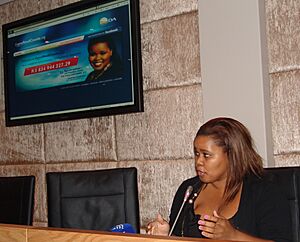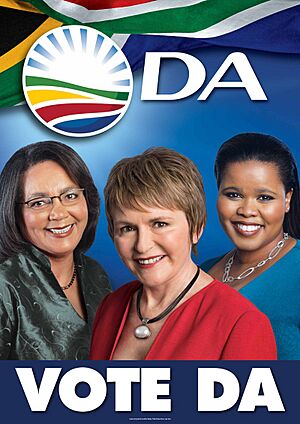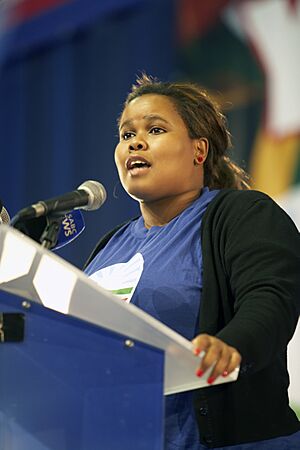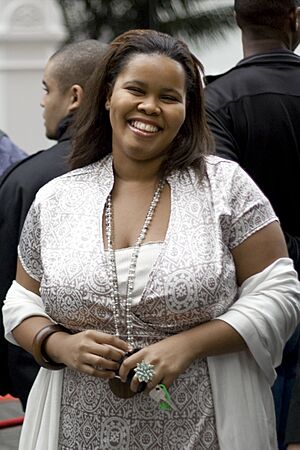Lindiwe Mazibuko facts for kids
Quick facts for kids
Lindiwe Mazibuko
|
|
|---|---|
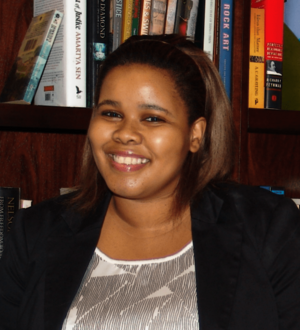
Mazibuko in March 2011
|
|
| 18th Leader of the Opposition | |
| In office 27 October 2011 – 6 May 2014 |
|
| Leader | Helen Zille |
| Preceded by | Athol Trollip |
| Succeeded by | Mmusi Maimane |
| Member of the National Assembly | |
| Assembly Member for KwaZulu-Natal |
|
| In office 6 May 2009 – 21 May 2014 |
|
| Personal details | |
| Born |
Lindiwe Desire Mazibuko
9 April 1980 Manzini, Swaziland |
| Nationality | South African |
| Political party | Democratic Alliance |
| Education | St. Mary's Diocesan School for Girls, Kloof |
| Alma mater | University of KwaZulu-Natal University of Cape Town Harvard Kennedy School |
Lindiwe Desire Mazibuko (born 9 April 1980) is a South African writer, activist, and former politician. She is known for being the first black person to be the Leader of the Opposition in South Africa's National Assembly. From 2011 to 2014, she was the parliamentary leader for the Democratic Alliance (DA), a major political party.
Mazibuko was a member of the National Assembly from 2009 to 2014. During this time, she was also the DA's national spokesperson. After leaving politics, she started an organization called Futurelect. This group helps teach young people in Africa about public service and leadership.
Contents
Early Life and Schooling
Lindiwe Mazibuko was born on 9 April 1980, in Manzini, Swaziland. Her parents were South Africans of Zulu heritage. Her father was a banker, and her mother was a nurse. When Lindiwe was six, her family moved back to South Africa and lived in Umlazi, a township near Durban.
To get a good education during the apartheid era, her parents sent her to private schools. She attended Carmel College, a Jewish primary school in Durban. She finished high school in 1997 at St. Mary's Diocesan School for Girls.
Mazibuko was a talented singer and toured with her school choir. She wanted to study music in Scotland but couldn't afford it. Instead, she studied music at the University of KwaZulu-Natal for a year. She later moved to Europe and lived in London for a while. When she returned to South Africa, she studied at the University of Cape Town. She earned degrees in French, classics, media studies, and political communication.
Beginning a Career in Politics
In 2007, Mazibuko wrote her university thesis about the Democratic Alliance (DA). While researching, she began to agree with the party's ideas, especially its focus on helping the poor. She felt she could no longer support the African National Congress (ANC), the party her family had always supported.
Mazibuko believed that more black South Africans should join the DA to make it more representative of the country. After graduating, she saw a job advertisement and was hired as a researcher for the DA in parliament. In 2008, she became the party's national media liaison officer. Soon after, she decided to run for a seat in parliament in the 2009 general election.
Working in the Shadow Cabinet
In the 2009 election, Mazibuko won a seat in the National Assembly. She was appointed as the DA's national spokesperson and also became a member of the "shadow cabinet." A shadow cabinet is a team of politicians from the opposition party. They watch over the work of the government ministers to hold them accountable.
At just 29 years old, many people saw Mazibuko as a "rising star" in the DA. She was known for her great public speaking skills and her ability to create strong arguments quickly. In 2010, she was promoted to Shadow Minister of Rural Development and Land Reform. She became one of the main faces of the DA during the 2011 local elections, appearing on posters with party leaders Helen Zille and Patricia de Lille.
Becoming Leader of the Opposition
A Campaign for Leadership
In 2011, Mazibuko decided to run for the position of DA parliamentary leader. This role also made her the official Leader of the Opposition in Parliament. She ran against Athol Trollip, a more experienced member of the party.
Mazibuko's campaign focused on bringing a younger, more energetic, and more diverse leadership to the DA. She ran a very public and professional campaign, which was unusual for an internal party election. Many people, including the Mayor of Cape Town, Patricia de Lille, supported her. There was also a belief that the DA's main leader, Helen Zille, supported Mazibuko's campaign.
On 27 October 2011, Mazibuko won the election by a large margin. At 31 years old, she became the first black person to hold the position of Leader of the Opposition in South Africa.
Challenges and Achievements in Parliament
As Leader of the Opposition, Mazibuko often challenged President Jacob Zuma and the ruling ANC party. One of her biggest actions was trying to pass a motion of no confidence against the president. This is a formal process in parliament to show that the members no longer support the leader.
When the Speaker of Parliament blocked the motion, Mazibuko took the case to court. In 2013, the Constitutional Court ruled in her favor. The court said the rules for motions of no confidence were unfair and needed to be changed. This was a major victory for holding the government accountable.
During her time in parliament, Mazibuko faced a lot of criticism from opposing politicians. Some made unkind comments about her age, gender, and background. However, she said these attacks showed that her opponents saw her as a political threat.
Disagreement and Resignation
In 2013, Mazibuko had a public disagreement with DA leader Helen Zille. The disagreement was about a policy called Black Economic Empowerment (BEE). Mazibuko's team in parliament voted to support a BEE law, but Zille disagreed and publicly overruled the decision. This created tension between the two leaders.
In May 2014, after the general election, Mazibuko announced she was leaving politics for a while. She said she was going to study at Harvard University in the United States. She explained that she wanted to gain more knowledge to better serve South Africa in the future.
Her resignation surprised many people. Some thought it was because of her disagreement with Zille. Others believed she was leaving because she might have lost the next internal election for parliamentary leader. Mazibuko said her decision was about her education and future, not party politics.
Life After Politics
In 2015, Mazibuko earned a Master of Public Administration degree from Harvard Kennedy School. After graduating, she stayed at Harvard as a resident fellow, teaching a study group on building strong institutions in new democracies.
In 2018, Mazibuko co-founded an organization that later became Futurelect. She is now the chief executive officer (CEO). Futurelect is a non-profit group that trains young Africans who want to work in public service. It focuses on teaching ethical leadership and skills for building a better future for the continent.
Ahead of the 2024 South African election, Futurelect launched a program to encourage young people to vote. This included a mobile app to provide voter education. Mazibuko also writes a weekly column for the Sunday Times newspaper.
While she is no longer a formal member of the DA, Mazibuko remains an important voice in South African public life. She often speaks out about politics and leadership in the country.
Personal Life
 | Frances Mary Albrier |
 | Whitney Young |
 | Muhammad Ali |


